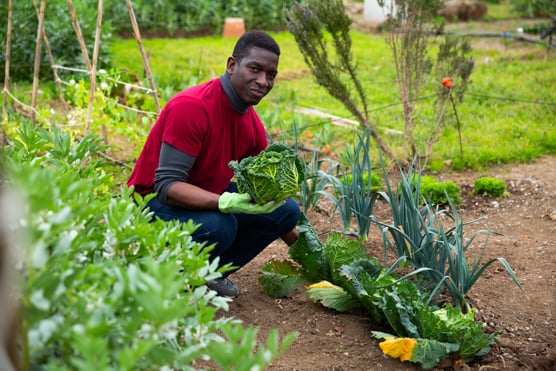The Best Gardening Plants for Low-Maintenance and High Award
The Best Gardening Plants for Low-Maintenance and High Award
Blog Article
Understanding the Various Kinds Of Horticulture and Exactly How They Add to a Much Healthier Way Of Life and Atmosphere
:max_bytes(150000):strip_icc()/close-up-of-a-women-watering-vegetables-in-a-raised-bed-1407277094-c63fd1ff0a21406ebf17c51ac6c6f2d1.jpg)
Benefits of Vegetable Gardening
Numerous individuals are progressively recognizing the myriad advantages of vegetable gardening as an essential component of a healthier way of life. Involving in veggie horticulture provides various physical health and wellness benefits, consisting of raised exercise, which enhances cardiovascular health and wellness and promotes general physical fitness. The act of growing, weeding, and harvesting needs movement and can assist deal with inactive habits, adding to weight administration and enhanced muscular tissue tone.
In addition, growing one's very own veggies considerably enhances nutritional quality. Native produce is frequently fresher and much more nutrient-dense compared to store-bought alternatives, as it can be taken in soon after harvest. This availability motivates a higher intake of vegetables and fruits, which are essential for stopping chronic diseases.
Additionally, veggie horticulture promotes mental well-being by providing a healing electrical outlet for anxiety relief and leisure. The act of often tending to plants can be introspective, permitting individuals to connect with nature and run away the pressures of day-to-day live. The lasting practice of growing one's very own food minimizes reliance on business agriculture, adding to environmental preservation and promoting biodiversity. Jointly, these benefits emphasize the value of vegetable gardening as a keystone of a healthier way of living.
Checking Out Blossom Horticulture

In enhancement to visual advantages, blossom horticulture supports neighborhood environments. Lots of blooming plants draw in pollinators, such as and butterflies, which are critical for maintaining biodiversity. The presence of diverse vegetation can also improve soil health and wellness, as numerous plants add to nutrient cycling and enhance dirt framework.
Furthermore, blossoms can play a significant duty in promoting sustainable practices. Many gardeners select indigenous or drought-resistant varieties, which call for less water and very little chemical inputs. This technique not only profits the environment but also urges liable horticulture behaviors.
Ultimately, blossom horticulture offers as an important element of an alternative gardening method. Gardening. By growing elegance and supporting local ecological communities, it integrates with vegetable horticulture and emphasizes the value of nurturing both our physical and mental well-being via nature
Container Gardening Benefits
Container gardening offers many benefits that make it an appealing option for both amateur and skilled garden enthusiasts. Among the primary advantages is its adaptability; containers can be positioned on outdoor patios, balconies, and even inside your home, permitting gardening precede with restricted ground accessibility. This flexibility allows people in city atmospheres or those with small backyards to cultivate plants effectively.
In addition, container gardening provides boosted control over soil quality and dampness degrees. Garden enthusiasts can select specific dirt mixes to maximize plant health and wellness and home minimize concerns like weeds and insects. The movement of containers additionally enables for easy moving to optimize sunlight exposure or safeguard plants from severe weather.
Additionally, container yards can be visually pleasing, using an opportunity for creativity in style. Gardening. They can act as attractive elements that improve outdoor or indoor spaces while promoting biodiversity by drawing in pollinators
Finally, container horticulture can add to a much healthier way of living by urging exercise, as it usually includes training, planting, and keeping plants. Overall, the benefits of container gardening make it an available and rewarding practice for those looking for to improve their way of life and environment.
The Surge of Vertical Horticulture
As metropolitan areas become significantly crowded, the pattern of vertical horticulture has actually removed, allowing individuals to maximize their gardening potential in limited areas. This innovative method involves growing plants in upright frameworks, such as wall-mounted planters, trellises, or specialized vertical yard systems. The charm of vertical horticulture lies not only in its effective use room but also in its visual payment to metropolitan environments, changing bare walls right into rich green landscapes.
Vertical gardens can be installed in homes, balconies, and community spaces, offering a platform for expanding a selection of plants, including natural herbs, veggies, and decorative flowers. This approach urges biodiversity and can enhance air high quality by filtering toxins while advertising a link to nature in largely inhabited areas. In addition, vertical gardening offers sensible benefits, such as boosted yield per square foot, making it an eye-catching option for metropolitan garden enthusiasts seeking to expand their own food.

Sustainable Practices in Gardening
Accepting lasting practices in horticulture is crucial for promoting ecological health and making sure the viability of our all-natural sources. Sustainable horticulture techniques concentrate on minimizing ecological impact, preserving water, and fostering biodiversity. By executing techniques such as organic horticulture, garden enthusiasts can reduce using artificial plant foods and pesticides, which can damage regional see this page ecosystems.
Friend planting is another effective lasting approach, where particular plants are expanded with each other to improve development and hinder parasites naturally. Furthermore, utilizing native plants in landscape design supports regional wildlife and requires less upkeep, as they are inherently adjusted to the regional environment and dirt conditions.
Water conservation techniques, such as rainwater harvesting and additional resources drip irrigation, help to efficiently manage water sources, therefore reducing waste. Additionally, composting organic waste not just improves the soil however also decreases garbage dump contributions, promoting a circular economy.
Lastly, practicing plant turning and cover cropping enhances soil health and wellness and decreases the danger of parasite problems. By integrating these sustainable techniques, gardeners can create durable ecological communities that contribute to a healthier way of life while securing the setting for future generations.
Conclusion

Finally, the varied methods of horticulture, consisting of vegetable, flower, container, and upright horticulture, jointly promote a much healthier lifestyle and boost ecological sustainability. Each type offers unique advantages, from offering fresh produce and attracting pollinators to optimizing minimal areas and encouraging biodiversity. By fostering lasting techniques, these gardening comes close to not only add to specific well-being but likewise support broader ecological preservation initiatives, inevitably lowering dependence on commercial agriculture and enhancing community durability.
Report this page